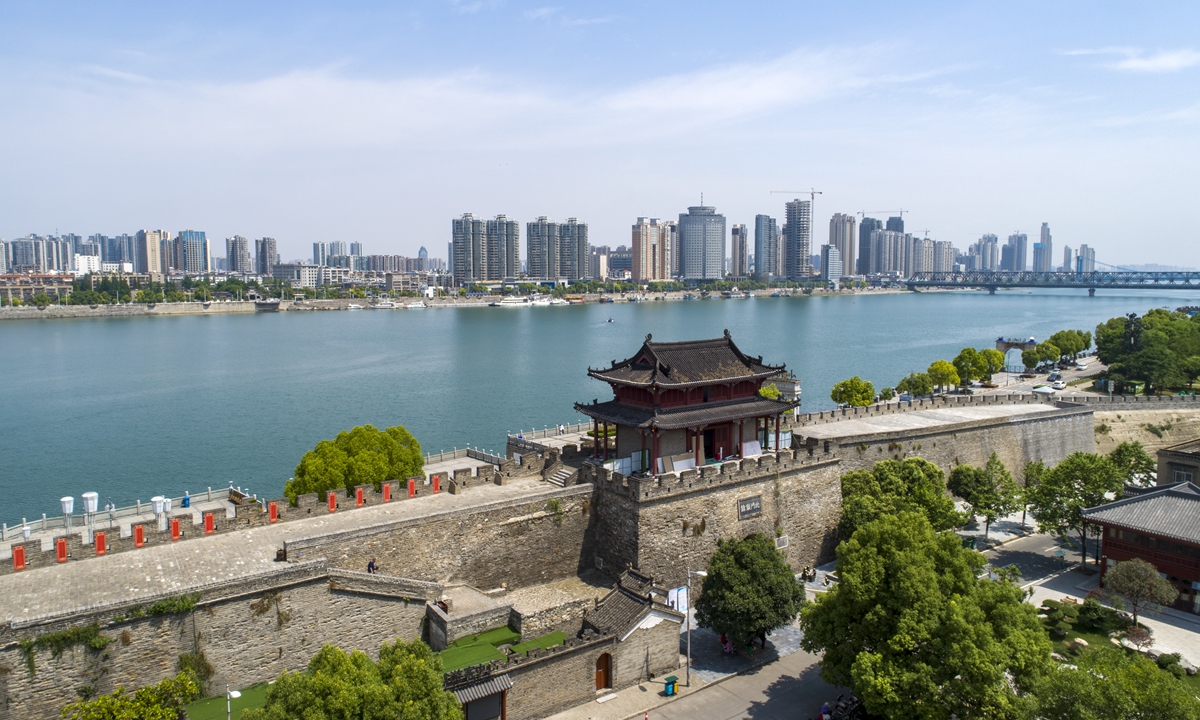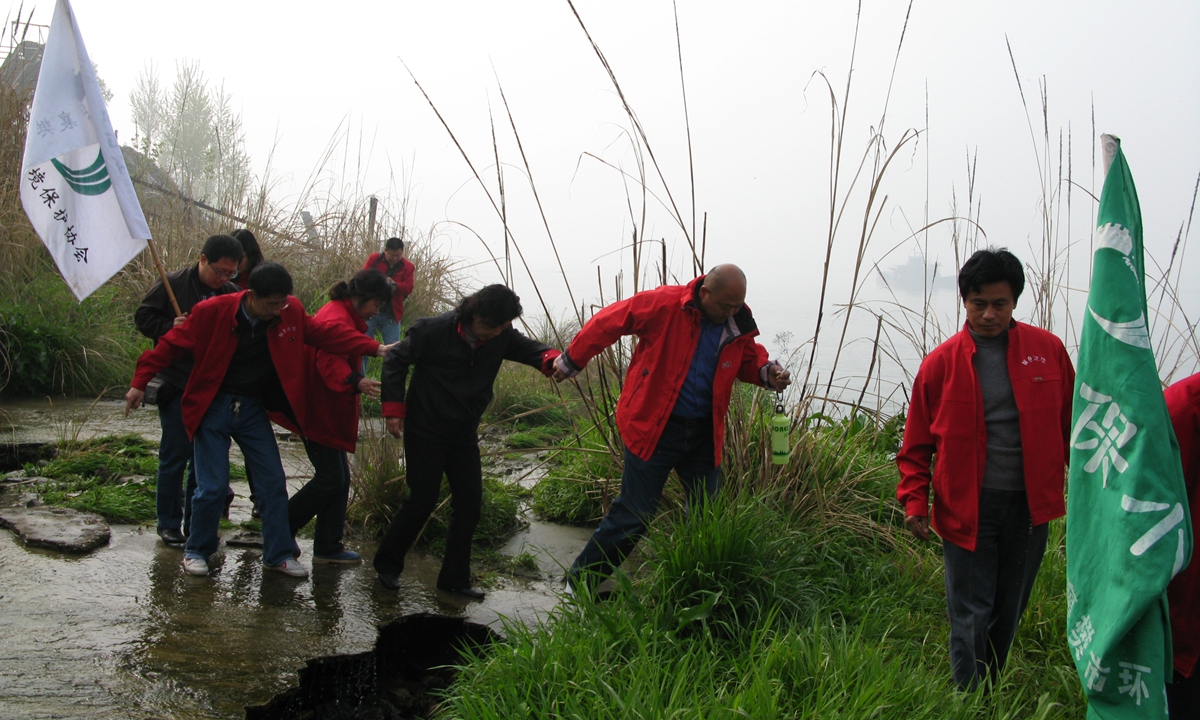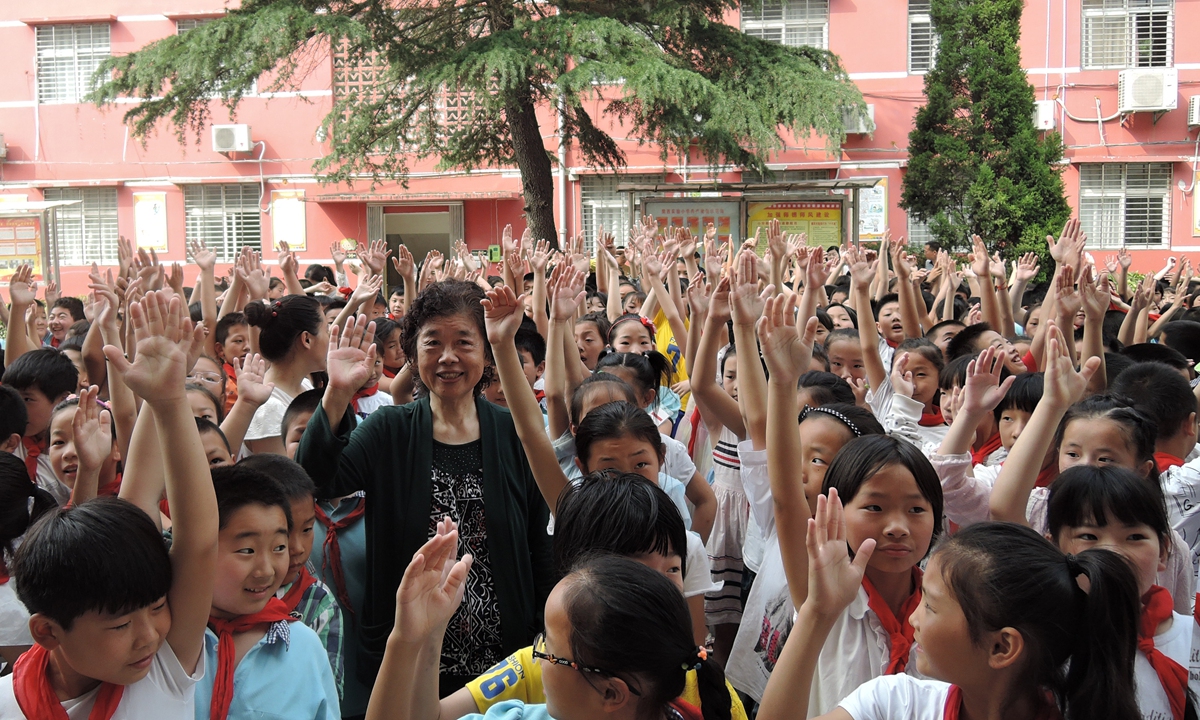Editor’s Note:
Over the last decade, China has witnessed tremendous changes, which could not have been achieved without the hard work of its people.
There are many ways to record the last decade, but the story that, at times, leaves a mark on each person is surely the most vivid. To greet the 20th National Congress of the Communist Party of China (CPC) scheduled to be held later this year, the Global Times has launched a series of stories to show esteem to people from all walks of life who have contributed their wisdom and energy to the realization of the Chinese Dream.
In this installment, a river chief – hezhang in Chinese – on the Yangtze River’s longest branch shares her impressions of the improvement in governmental policy support and people’s awareness in water environmental protection.

The Hanjiang River passes Xiangyang city, Central China’s Hubei Province Photo: VCG
Even at the age of 78, Yun Jianli never tires of promoting environmental conservation on the Hanjiang River.
The 1,577-kilometer-long river that runs through six provincial regions is the longest branch of the Yangtze River. It is known as the “mother river” for the folks living along it.
Twenty-two years ago, when Yun learned about the extent of pollution in the Hanjiang River, she saw an urgent mission to protect the river. She organized an environmental association in 2002 and devoted herself to the conservation work in Xiangyang, Central China’s Hubei Province. Xiangyang is a key city on the Hanjiang River.
Through her advocacy, more and more people joined the army of environmental protection.
But it was in the last decade that tremendous improvements have occurred in environmental and ecological conservation across China. The idea that “lucid waters and lush mountains are invaluable assets” has been deeply rooted in the hearts of the Chinese people.
In 2017, Yun became one of the first “folk river chiefs” in the country, an honor to acknowledge her hard work, as well as a duty to motivate her in guarding Hanjiang River and the Yangtze River.
First rolled out in 2003, the river chief system has been promoted across the country since 2017 and has seen significant positive results.
By the end of 2021, more than 300,000 river chiefs around China had been appointed, covering cities, townships, counties and provinces, the People’s Daily reported in January, citing the Ministry of Water Resources.
It is the “final kick” to the comprehensive establishment of China’s river and lake management and protection responsibility system. Many problems and crises have been remedied and tackled since then, and the waters in the lakes and rivers have now run clear again.
River boss
In Xiangyang, almost everybody knows Yun. People call her “environment grandma.”
Born in 1944, Yun used to be a biology teacher. Before her retirement, she was a member of Hubei Provincial Committee of the Chinese People’s Political Consultative Conference.
In 2002, Yun initiated the Environmental Protection Association of Xiangyang, also known as the “Green Hanjiang River,” which was the first nongovernmental environmental protection organization in Hubei.
Since the establishment of the association, Yun and her volunteer team have been working on the frontlines of Hanjiang River’s protection, and their deeds have inspired more residents to participate in the protection efforts through various activities.
They investigated, for instance, pollution sources along the Hanjiang River and its tributaries hundreds of times, and completed an investigation report on water pollution in the Xiangyang section of the Hanjiang River.
They helped solve hundreds of pollution cases along the river and have also trained thousands of environmental protection talents for free.

Yun Jianli and teammates at field research Photo: Courtesy of Yun
Once, when Yun’s association received a report from a resident that a semiconductor manufacturing company was discharging pollutants into the Hanjiang River, Yun and her volunteers traced and found the discharging location of the company where the wastewater discharged by the factory seriously exceeded the standards.
Yun publicized the case through the media, and reported it to district and city environmental departments. After several months, the company’s discharge water was up to code.
When asked by the environmental department why Yun’s words had such power, the person in charge of the company said, “Aunt Yun asked us: Your parents and children have to drink water from the Han River. Do you have a good conscience when you discharge sewage into the Han River?”
“It forced us to invest more than 8 million yuan into pollution control facilities. At that time, the cost increased by 20 percent, but the efficiency doubled, and orders from large international companies also began to come in,” he said.
In 2017, Yun was “hired” as the first “fork river chief” of the Hanjiang River by the Xiangyang government.
Though no ceremony was held, Yun was awarded with a formal letter of appointment.
Yun said that as a river chief, she is in charge of several tasks. For instance, she has to inspect the pollution management of local rivers and reservoirs. She also needs to “supervise” other river chiefs who are also governmental officials.
She often visits river banks and reservoirs to promote water environmental protection and calls on people to act.
“I have made 1,156 speeches over the last two decades to increase people’s awareness in the protection of our river,” she said. “Even though now I do not visit the river bank every day, I try my best to do field research as much as possible.”
“People would report incidents of river pollution to us, and we would set off to investigate,” she said, “We would report to the relevant governmental department as soon as possible afterward.”
Calling for more people to participate
“We faced difficulties at the very beginning. For instance, we had problems getting funding. Also, even though most people would welcome our work in environmental protection, there were also many who did not understand us, and they even ‘hated’ and ‘attacked’ environmental potection volunteers,” she told the Global Times.
“Some pollutant companies, for instance, would rail against our work as our efforts would directly disrupt their businesses,” she explained.
“But now the awareness among the public has increased greatly. Also, governance and management around the issue is very clear, and government officials have served as river chiefs too in protecting the rivers,” Yun said.
“River management has become much easier now.” Yun would try her best to enter communities, campuses, companies, villages, and governmental institutes to promote the ideas of ecological and environmental water protection.

Yun Jianli with children Photo: Courtesy of Yun
She even came up with a few doggerels about water protection, which are very popular among the public. She loves to boost the awareness of environmental protection in schools. “You had better use your own bottles instead of buying bottled drinks,” she tells the school children.
In her speeches, she uses small experiments to let students understand how a bottle of clean water can become polluted, and is “managed” and “purified.” She tries to tell the children that “every person’s action could affect the environment. We enjoy the beautiful scenery and therefore should also protect it.”
The great campaign to protect mother river
Chinese President Xi Jinping, also general secretary of the Communist Party of China Central Committee and chairman of the Central Military Commission, has attached great importance to the ecological protection of the 6,300-kilometer-long Yangtze, China’s longest river. Over the past few years, he has undertaken multiple inspection tours along the Yangtze River, the Xinhua News Agency reported.
He has also convened several symposiums to advance the development of the Yangtze River Economic Belt, which covers nine provinces and two municipalities, and accounts for more than 40 percent of China’s population and economic aggregate.
“Put restoring the ecological environment of the Yangtze River in a dominant position,” Xi once said.
“The Yangtze River boasts a unique ecological system. Restoring its ecological environment will be an overwhelming task, and no large-scale development will be allowed along the river at present and for a rather long period to come,” he said, Xinhua reported.
“Currently, our country pays great attention to environmental protection, especially since the 18th National Congress of the Chinese Communist Party (CPC) in 2012,” Yun told the Global Times. “I’m really grateful to President Xi for valuing the conservation of rivers and reservoirs.”
“Now more people are taking actions, and we volunteers are not alone. Moreover, the targeted policies are our silver bullet in maintaining the clear water in the rivers,” she said.
Since 2018, city-, county-, township-, and provincial-level river and lake chiefs have inspected rivers and lakes for an average of 7 million times per year.
More than 20 provinces have established a cross-provincial river and lake joint prevention and control mechanism. Joint inspections and law enforcement are carried out, which form a strong synergy in river and lake management and protection.
Since 2018, a total of 11,000 people have been held accountable for having failed to perform their duties as river chiefs. During the same period, the Ministry of Water Resources has launched special campaigns to solve up to 187,000 cases, including disorderly occupation, mining, and unauthorized construction along rivers and lakes.
Through the years, Yun has been invited to other parts of China and even other countries to share her story for her great contribution to the protection of Hanjiang River and the Yangtze River.
“I have been to different countries and regions. I have seen the Hudson River in New York and the Seine in Paris, and I think the water quality of the two rivers was not as good as our Hanjiang River,” she said.
“We have to protect our beautiful river through the generations to come. This is our greatest duty,” she said.













